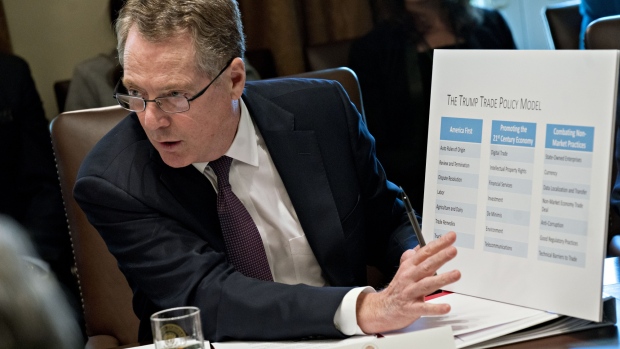Mar 12, 2019
U.S. wants to keep tariff threat in China talks: Lighthizer
, Bloomberg News

President Donald Trump’s top trade negotiator said the administration needs to keep the option of raising tariffs on Chinese imports as a way to ensure Beijing lives up to any trade agreement.
“We have to maintain the right to be able to -- whatever happens to the current tariffs -- to raise tariffs in situations where there’s violations of the agreement,” U.S. Trade Representative Robert Lighthizer said Tuesday in testimony before the Senate Finance Committee. “If we don’t do that then none of it makes any difference.”
Under questioning from Democratic Senator Ron Wyden, Lighthizer declined to say the administration will roll back U.S. tariffs if it reaches a deal with the Chinese. “That’s still a subject matter of negotiation,” Lighthizer said.
Lighthizer’s comments pushes back against speculation that a deal between the U.S. and China could see them reverse roughly US$360 billion in tariffs they’ve imposed on each other’s imports since July. Investors have been heartened by signs that Trump is looking to sign a deal with Chinese leader Xi Jinping, possibly at a summit at Trump’s Mar-a-Lago resort in Florida as early as this month.
Enforceable Deal
Lighthizer said that the U.S. is making “headway” on issues it considers important, including its desire for China to make deep structural changes to its state-driven economic system. Negotiators are working continuously, and the final document will be very detailed, possibly running as many as 120 pages, he said.
“Something is either going to have a good result or we’re going to have a bad result before too long but I’m not setting a specific timeframe,” said Lighthizer, adding that any deal must be enforceable or President Donald Trump won’t sign it.
China is pushing for the U.S. to remove tariffs imposed on its goods last year following a USTR probe into Beijing’s intellectual property practices known as a Section 301 investigation, said the trade chief.
“The focus of the negotiation from the Chinese side is the removing of 301 tariffs,” said Lighthizer. China is also asking for “specific market access provisions that we also are considering.”


